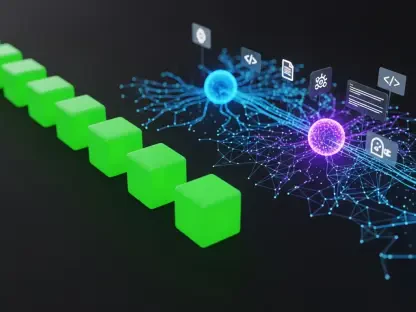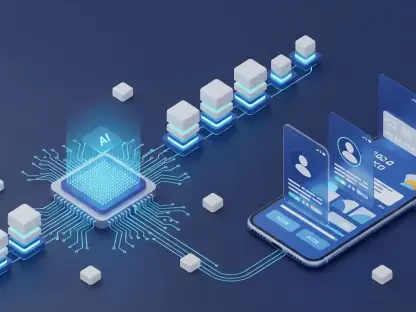Overview of the DevSecOps and AI-Native Software Market
Imagine a world where software development cycles are slashed by half, security breaches are preemptively thwarted, and operations run seamlessly across hybrid environments—welcome to the reality of DevSecOps in 2025. This integrated approach, combining development, security, and operations, has become the backbone of modern software practices, especially as enterprises grapple with escalating cyber threats and complex IT infrastructures. The software-as-a-service (SaaS) industry, a critical enabler of this shift, continues to thrive, driven by the demand for scalable, cloud-based solutions that streamline workflows and enhance collaboration.
Within this dynamic landscape, DevSecOps stands as a transformative methodology, ensuring that security is not an afterthought but a core component of the development lifecycle. Key players like GitLab, Atlassian, and Microsoft dominate the market, yet GitLab distinguishes itself with a unified platform that spans the entire software development process. Its open-core model and cloud-agnostic approach resonate with enterprises seeking flexibility and interoperability, positioning the company as a formidable competitor in a crowded field.
The rise of artificial intelligence (AI) further accelerates this evolution, with AI-native tools reshaping how developers code, test, and deploy applications. Market projections indicate that AI in software development will unlock significant value over the next few years, fueled by enterprise adoption and stringent regulatory demands. As organizations prioritize compliance with data protection laws and zero-trust architectures, the intersection of AI and DevSecOps offers both immense opportunities and unique challenges, setting the stage for innovation and disruption.
GitLab’s Q2 Financial Performance and Growth Metrics
Key Financial Highlights
GitLab’s financial results for the second quarter of 2025 showcase remarkable growth and operational efficiency, underscoring its robust market position. The company reported revenue of $236 million, reflecting a substantial 29% year-over-year increase, driven by strong demand for its DevSecOps platform. Additionally, GitLab achieved a non-GAAP operating margin of 17%, a clear indicator of improved profitability, alongside a free cash flow of $46.5 million, providing ample resources for reinvestment and strategic initiatives.
Customer metrics further highlight GitLab’s success in expanding its footprint, particularly among enterprise clients. With a dollar-based net retention rate of 121%, the company demonstrates strong customer loyalty and the ability to upsell existing accounts. Growth in annual recurring revenue (ARR) from enterprise segments reinforces GitLab’s appeal to larger organizations seeking comprehensive solutions for secure software development, cementing its status as a trusted partner in digital transformation.
Market Trends and Growth Projections
Looking at broader industry trends, the AI-native software development market is poised for explosive expansion, with forecasts estimating a value of $467 billion by 2030 at a compound annual growth rate (CAGR) of 25%. This growth is fueled by the increasing integration of AI tools that automate repetitive tasks and enhance productivity across development teams. GitLab’s offerings align closely with these trends, positioning it to capitalize on the rising demand for intelligent, integrated platforms.
Generative AI, a subset of this market, is expected to grow even faster, with a projected CAGR of 38.7% through 2029, transforming how code is written and tested. GitLab’s forward-looking guidance for fiscal 2026, targeting revenue between $936 million and $942 million, reflects confidence in sustained momentum. This outlook not only mirrors industry growth patterns but also underscores the company’s strategic focus on leveraging AI to drive innovation and customer value in the DevSecOps space.
Challenges in AI-Driven DevSecOps Adoption
The integration of AI into DevSecOps, while promising, is not without significant hurdles that enterprises must navigate. Security concerns remain paramount, as AI tools often handle sensitive data and code, raising questions about vulnerability to breaches or misuse. Many organizations hesitate to fully embrace these technologies due to fears of unintended consequences, such as biased algorithms or lack of transparency in decision-making processes.
Technological barriers also pose challenges, particularly around maintaining auditability and trust in AI-driven systems. Ensuring that AI outputs are traceable and compliant with enterprise standards is critical, yet complex, especially in regulated industries like finance and healthcare. GitLab addresses these issues by prioritizing transparency in its AI tools, such as the GitLab Duo platform, and by investing in features that enable detailed logging and oversight for accountability.
Market-driven obstacles, including fierce competition and the transition to hybrid pricing models, further complicate adoption. Rivals offering similar AI-enhanced solutions create pressure to innovate continuously, while shifts from traditional licensing to usage-based fees can unsettle customers accustomed to predictable costs. GitLab counters these challenges through strategic partnerships and a commitment to customer-centric innovation, ensuring its platform remains both competitive and adaptable to evolving market needs.
Regulatory Landscape and Compliance in DevSecOps
Navigating the regulatory landscape is a critical aspect of modern software development, with laws like the General Data Protection Regulation (GDPR) imposing strict requirements on data handling and privacy. These regulations shape how companies design and deploy DevSecOps solutions, pushing for greater accountability and protection mechanisms. For GitLab, compliance is not just a necessity but a competitive differentiator, as it embeds regulatory considerations into its platform to support global enterprises.
The adoption of Zero Trust security frameworks, now utilized by 76% of organizations, underscores the industry’s shift toward rigorous security standards. GitLab aligns with these principles by offering tools that facilitate secure collaboration and continuous monitoring, ensuring that development processes meet the highest safety benchmarks. This alignment enhances trust among clients who prioritize robust security postures in their software environments.
Partnerships play a pivotal role in addressing compliance needs, particularly for regulated sectors. GitLab’s collaboration with Amazon Web Services (AWS) ensures data residency and adherence to regional regulations, making its solutions viable for industries with stringent requirements. As regulatory frameworks continue to evolve, GitLab’s proactive strategies—such as integrating compliance features and fostering alliances—position it to adapt swiftly to changes, maintaining relevance in a tightly governed market.
Future Outlook for GitLab and the DevSecOps Industry
Emerging technologies, such as agentic AI tools like GitLab Duo Workflow, are set to redefine the DevSecOps landscape by enabling autonomous task management and decision-making. These innovations promise to further reduce manual workloads, allowing developers to focus on creative problem-solving rather than repetitive processes. GitLab’s early adoption of such tools signals its intent to lead in a market increasingly driven by automation and intelligence.
Enterprise preferences are also shifting toward multi-cloud and hybrid environments, reflecting a need for flexibility in IT infrastructure. GitLab’s cloud-agnostic platform provides a distinct advantage here, enabling seamless operation across diverse systems and avoiding vendor lock-in. This adaptability is likely to attract organizations seeking to balance innovation with operational control in complex digital ecosystems.
Global economic factors and potential market disruptors, such as geopolitical instability or rapid technological breakthroughs, could influence growth trajectories. Despite these uncertainties, GitLab’s emphasis on innovation—evidenced by significant investments in research and development and strategic executive hires—positions it to weather challenges and seize opportunities. The company’s forward-thinking approach ensures it remains a key player in shaping the future of software development and security integration.
Conclusion and Investment Potential
Reflecting on GitLab’s journey through the second quarter of 2025, its financial strength, with $236 million in revenue and a 29% year-over-year growth, paints a picture of resilience and ambition. The company’s pioneering efforts in AI-driven DevSecOps, coupled with a steadfast commitment to market leadership, establish a benchmark for innovation in the SaaS domain. As challenges in adoption and regulatory compliance are navigated with strategic foresight, GitLab emerges as a trusted ally for enterprises worldwide.
Looking ahead, stakeholders and investors should consider focusing on GitLab’s scalability and adaptability as key areas of opportunity. Exploring deeper integrations of AI tools to address specific industry pain points could unlock further value, while continued partnerships with cloud providers might enhance compliance capabilities. For those eyeing investment, GitLab’s reasonable valuation, first-mover advantage in AI-native solutions, and long-term growth prospects in a high-potential market offer compelling reasons to engage, paving the way for sustained impact in the evolving tech landscape.









